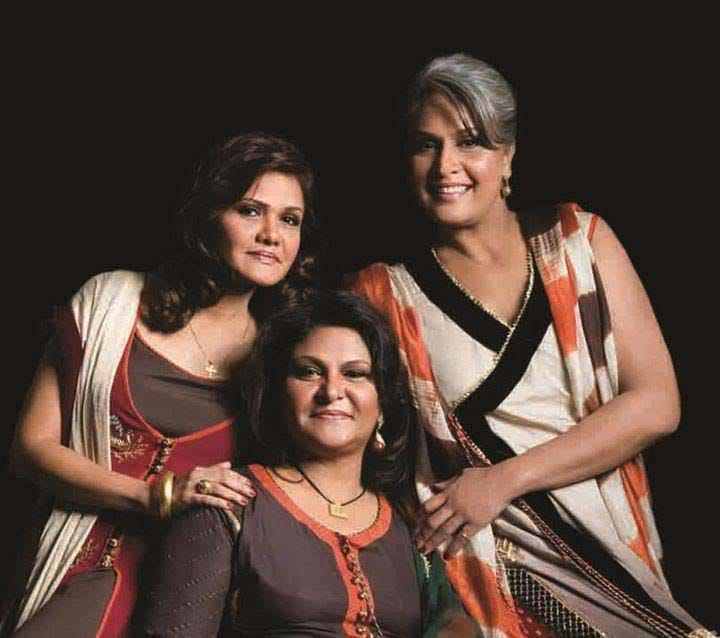The White Post Special
In the late 1970s and early 1980s, when Pakistan’s music industry was dominated by classical and ghazal singers, a fresh and vibrant sound emerged that changed the landscape of pop music. That sound belonged to the Benjiman Sisters — Nerissa, Shabana, and Beena. With their infectious energy, stylish outfits, and unique blend of Western pop and Pakistani sensibilities, they carved out a space in an industry that wasn’t quite ready for them. But the Benjiman Sisters weren’t just singers; they were trailblazers who defied societal norms and inspired a generation of young women to dream big.

A Musical Upbringing:
Growing up in Karachi in a Goan Christian family, the sisters were surrounded by music from a young age. Their father, a musician himself, fostered their talent and encouraged their love for singing. They often performed at local events, family gatherings, and church services, honing their skills in harmonizing and stage presence. The Karachi of their childhood was a multicultural city, and this exposure to different cultures and music styles greatly influenced their artistic direction.
Unlike most other musicians of the time, the Benjiman Sisters were drawn to Western pop music. Groups like ABBA and the Bee Gees were global sensations, and the sisters, with their ear for catchy tunes, began experimenting with their own versions of pop songs. Little did they know that their early performances would lay the foundation for them to become icons in Pakistan’s evolving music scene.
Breaking Into the Spotlight:
Their breakthrough came when they started performing on PTV, Pakistan’s state television network. Shows like Naiyya and Music ’79 gave them national exposure. Their performance style, which included synchronized dance routines and matching outfits, was a breath of fresh air in the local music scene. At a time when most performers were traditional singers or playback artists, the Benjiman Sisters brought a new kind of entertainment — one that was bold, modern, and unapologetically fun.
Their appearance on television was an instant hit, and the audience was captivated. Pakistan, though still steeped in traditional music, had a burgeoning youth population hungry for something different. The sisters offered exactly that. Their pop performances, influenced by Western music trends but localized for Pakistani audiences, resonated with the country’s youth. The Benjiman Sisters were soon catapulted to fame, becoming a household name in the process.

Pop Music with a Twist:
What made the Benjiman Sisters stand out wasn’t just their vibrant performances; it was their ability to fuse Western pop with local flavors. They sang both in English and Urdu, making their music accessible to a broad audience. Whether they were performing original songs or covering global hits, they brought their own distinct style, blending upbeat rhythms with harmonized vocals that were hard to forget.
Their collaboration with famed music producer Sohail Rana further cemented their place in Pakistani pop culture. Rana, known for shaping the sound of modern Pakistani music, saw the potential in the sisters’ progressive style. Under his guidance, they produced songs that became hits across the country. Their live performance of the song “Disco Deewane” on PTV, in particular, was a groundbreaking moment in the fusion of Western disco with Pakistani pop. It not only introduced disco to the Pakistani audience but also proved that the Benjiman Sisters were capable of crossing musical boundaries.
Challenges in a Conservative Society:
While the Benjiman Sisters enjoyed immense popularity, they were not without their critics. Pakistan in the late 1970s and early 1980s was undergoing significant political and social change. The regime of General Zia-ul-Haq, which promoted a more conservative Islamic way of life, had a profound impact on public attitudes, especially toward women in entertainment.
The sisters, with their modern style and Western-influenced music, often found themselves at odds with societal expectations. Performing in choreographed routines and wearing fashionable outfits did not sit well with everyone. The conservative segment of Pakistani society saw their boldness as a challenge to traditional values. However, despite the criticism, the Benjiman Sisters remained undeterred. Their focus remained on their music and their fans, who continued to support them.

Lasting Legacy:
Although their time in the spotlight was relatively brief, the Benjiman Sisters left an indelible mark on Pakistani pop culture. They paved the way for future female artists to pursue careers in music, proving that women could be successful in an industry dominated by men. Their influence was particularly evident in the emergence of Nazia Hassan, who followed in their footsteps with her iconic hit “Disco Deewane” in the 1980s. Nazia’s rise mirrored the success of the Benjiman Sisters and built on the foundation they had laid for female pop singers in Pakistan.
The sisters’ fearless approach to music and performance helped shift the perception of what pop music could be in Pakistan. By blending Western influences with local styles, they pushed the boundaries of the country’s musical traditions and introduced a generation of listeners to a new, exciting sound.
Evergreen Icons of Change:
The Benjiman Sisters may have come and gone from the public eye, but their legacy endures. They were more than just pop singers — they were pioneers who dared to be different in a time of cultural conservatism. Their contribution to Pakistani music was not only in the songs they sang but in the doors they opened for future generations of female performers. Their boldness, energy, and refusal to conform left an imprint on the hearts and minds of their fans, and they remain an important chapter in Pakistan’s musical history.


